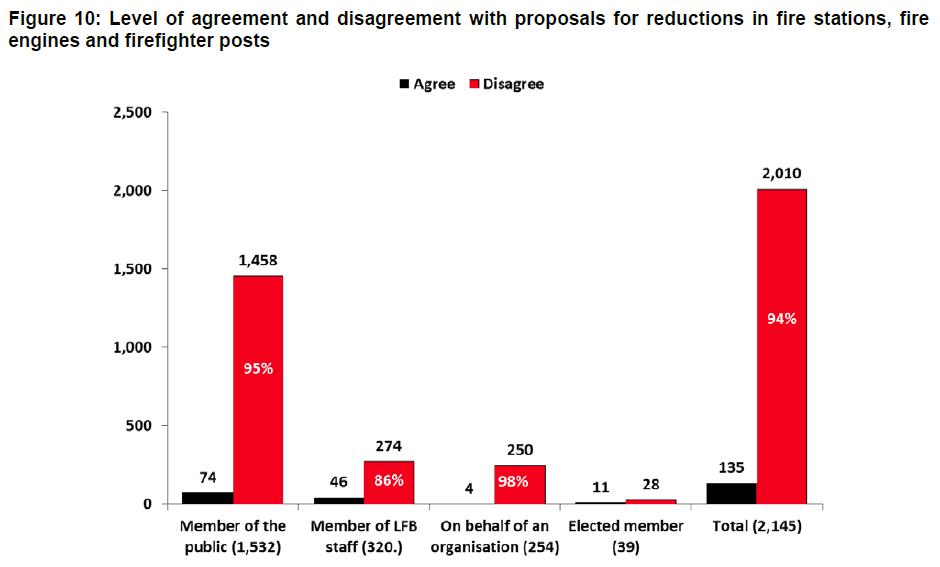
After all the months of consultation, 24 public meetings with 1,330 attendees, 23 council and scrutiny meetings, 13 petitions with a total of 21,770 signatures, 2,323 questionnaire responses at a cost of at least £172,377, the decision on whether to close 10 London fire stations, including Woolwich, comes down to one individual: Boris Johnson.
The consultation did result in some changes to the London Safety Plan: Clapham and New Cross fire stations would remain open, East Greenwich fire station would gain an additional fire engine and Chelsea fire station would keep its two fire engines. I couldn’t find anything in the consultation report and revised safety plan that mentioned the commitment made at the Greenwich consultation meeting to reconsider the closure of Woolwich Fire Station in light of the expected massive increase in the population of Woolwich Riverside. Coincidentally the day after the report was published I received a letter from the Royal Borough of Greenwich informing me that they had given planning permission for a further 2,032 homes in the Arsenal site – this is the plan for a series of blocks of flats up to 22 storeys high along the river front. That’s 2032 homes on top of the thousands already being built in the Arsenal site, just down the road from the fire station.
It seems from the consultation report that public opposition to the closure of Woolwich Fire Station wasn’t as strong as for others in the capital. Only 156 people signed the petition to save Woolwich Fire Station, compared to over 8,000 for the 3 petitions to keep Bow Fire Station and over 6,500 for those to save Clapham. Also no-one specifically mentioned Woolwich in their response to the questionnaire: other fire stations were named by respondents opposing their closure. The consultation meeting back in May was dominated by politicians, it was even commented during the meeting that very few “ordinary citizens” asked questions, though this may have been influenced by holding the meeting in Greenwich rather than Woolwich.
The YouGov analysis of the responses to the consultation questionnaire showed that an overwhelming 94% of respondents opposed any fire station cuts, graphically illustrated in the snippet from the report below.

Despite the opposition the Fire Commissioner presented the new plan, but the London Fire and Emergency Planning Authority (LFEPA) voted by 9 to 8 to reject the proposed cuts. Their e-mail on the subject said:
A majority of LFEPA Members (by 9 votes to 8) approved the following amendments – That:
1. The Authority instructs the Commissioner to delete from the Fifth London Safety Plan, supporting documents and appendices all references to station closures, appliance reductions and consequential operational post reductions, including reductions in Fire and Rescue Units, reductions in crewing levels of Fire and Rescue Units, alternative crewing of specialist units and reductions in officer numbers, and to make the subsequent changes that are necessary.
and also:
7. This Authority recognises and respects the single clearest issue raised during the consultation process: that Londoners do not want to see local fire stations closed. The Authority notes that the 1.2% Council Tax cut implemented by the Mayor came at a cost of £9.4million and that the Mayor’s plan to cut it by 10% over his four-year term will cost a further £70million making some £80million in total. Consequently the Authority calls on the Mayor to reconsider his policy of a 10% council tax cut and instead work with officers and members of the London Fire and Emergency Planning Authority to develop an approach that preserves London’s fire cover, saves London’s fire stations and balances the budget into the longer term.
The decision now rests with the Mayor of London, though a tweet from the London Fire Brigade Union yesterday reported that he is “minded” to overturn the LFEPA decision and close the fire stations.
Boris Johnson has written to the London fire commissioner, indicating he is ‘minded’ to overturn the fire authority’s rejection of cuts.
— London FBU (@LondonFBU) July 23, 2013
I’m not sure exactly what politicians mean when they are “minded” to do something. Have they just not quite made up their minds? Have they decided but are trying to avoid the criticism that a bad decision will attract? Whatever … it is starting to seem likely that Woolwich Fire Station will close after a hundred and twenty six years of operation.
